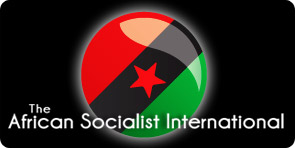Political Report to the Fifth Congress of the African People’s Socialist Party
Join the online studies / discussions: May 2 | May 9 | May 16
Table of Contents
- Imperialists cannot stem tide of national liberation
- The Party is the anti-colonial force in this time
- African People’s Socialist Party is heir to Marcus Garvey
- Pan-Africanism was the petty bourgeoisie; Garvey led the African working class
- African Internationalism advances Garvey Movement, defines imperialism in crisis
- African Internationalism shows the way forward
- African Internationalism led on the issue of reparations
- African workers must lead the struggle against parasitic capitalism
- ASI is the basis for a genuine Communist International
- White nation-state built on pedestal of slavery, colonialism
- White communists must be committed to overthrowing white power
- The African Socialist International is growing in Africa
- ASI resolution adopted at Party’s First Congress
- InPDUM leads mass resistance
- Revolutionary National Democratic Program: the political basis for black power
- Black is Back Coalition helps to advance RNDP
- African People’s Solidarity Committee another vehicle against U.S. imperialism
- White people must side with African workers not parasitic capitalism
- AAPDEP a tool against parasitic capitalist development
- AISO wins students to African Revolution
- African Redemption Church: the Party’s response to religious idealism
- Influencing and organizing African labor
- Party must address issue of African mass incarceration
- Formalizing the leadership of African women
- Solve the problem of recruitment
- Accountability and democratic centralism
- Party’s Department of Agit Prop has made great leaps
- Cadre development and leadership is key
- Office of Economic Development builds culture of self-reliance
White nation-state built on pedestal of slavery, colonialism
Hosea Jaffe authored an important book, “A History of Africa,” which speaks to the impact of slavery and colonialism on the emergence of parasitic capitalism and the development of white self-consciousness and the white nation itself:
“…Before capitalist colonialism there was no Europe, only a collection of feudal, mercantile and tribal towns, farms, villages, discrete states and kingdoms vying and warring with each other, just as in Africa, but on a different property basis — that of private property in the land. Europe then was neither a concept nor a reality, at most a vague idea that Arabs — but not ‘Europeans’ — had had long ago of some place northwest of Greece. As long as Europe remained isolated from the world, there was no Europe.
“When it became connected with and dependent on, first Africa, then the Americas and finally Asia, it began to become a reality and an idea. Only when Portuguese, Spanish, French, Italian, Dutch, English, German, Danish and Swedish confronted and clashed with Africa, America and Asia did the need arise for them to consider themselves as a set, a whole, different from, hostile to and, eventually, superior to Africans [aboriginal], Americans and Asians. Colonialism gave them a common interest.”
In the following passage, Jaffe also identifies the significance of our relationship to capitalism and its historical manifestation as a united white nation-state:
“This common interest — slaving, plantations, the world market, looting, precious metals, spices and territory, markets and sources of wealth — was also the source of their conflicts among themselves. From 1500 on they had already started to quarrel and fight over the colonial booty. In these intra-European conflicts Portugal and Spain had in time to give way to Holland and France, and these in the 18th Century to Britain, while German ‘hidden colonialists,’ Calvinists, Catholics and Jews alike, steadily garnered what they could of the booty without shedding their blood or losing their own property in the process. The ‘scramble for Africa’ that led to the 1884-5 Berlin Conference had its roots in four centuries of struggles between the European powers for the division of Africa. Colonialism, the basis of European unity, was the basis also of its disunity.”
Jaffe does a much better job than Marx in his elaboration of the birth process of Europe that resulted in the wretchedness of the majority of the world’s peoples up to now. Here is the dialectic:
“Europe was born out of colonialism, as the exploiting, oppressing, negating pole that tried always to destroy and assimilate its opposite pole: the rest of the world…
“The first form was that of ‘primary accumulation,’ from the 14th Century to the 19th; the next was that of regular accumulation, with an inertial momentum carried forward from the primary accumulation.
“With capitalism arose Europe, and with Europe the myth of ‘European civilization’ — a civilization based on African slavery, American plantations, Asian spices, precious metals from all three ‘non-European’ continents — based, too, on Indian numerals, Arab algebra, astronomy and navigation (an Arab-Indian took da Gama to India from Mombasa) and Chinese gunpowder, paper and compasses. This non-European European civilization was the narcissus-like admiration of its own conquests. The sword, gunfire, murder, rape, robbery and slavery formed the real material basis for the idea of European superiority.
“It was out of this process that the very idea of a European man arose, an idea that did not exist even in etymology before the 17th Century. Before the slave trade in Africa there was neither a Europe nor a European. Finally, with the European arose the myth of European superiority and separate existence as a special species or ‘race’; there arose indeed the myth of race in general, unknown to mankind before — even the word did not exist before the lingua franca of the Crusades — the particular myth that there was a creature called a European, which implied, from the beginning, a ‘white man.’
“Colonialism, especially in Africa, created the concept and ideology of race. Before capitalist-colonialism there were no races; but now, suddenly and increasingly, there were races: once born, the myth grew into a ‘reality.’”














